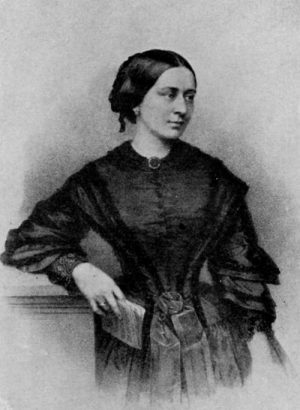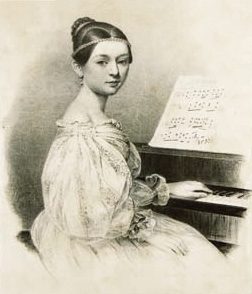Clara Schumann was an incredibly talented musician, shrewd businesswoman, and all-around force of nature.
As a child, her father had her copy out [often-disparaging] letters that he had written to concert-arrangers and patrons (under the guise of “improving her handwriting”), so from a young age, she gained a rare insight into the business side of music. Her father, Friedrich Wieck, also instilled in her an often-paranoid outlook on the world. Wieck saw “plots and cabals” all around, threatening to ruin his hard work and investment in Clara’s success. This attitude, combined with a determination to succeed, is possibly responsible for the single-mindedness with which she approached concert touring and her general status as a professional musician. She often viewed other up-and-coming musicians as rivals, even when she was older and had established herself as the European “Queen of the Piano.”
Her ability to garner audiences [read: money] made her somewhat blind to the sensitivity of her husband Robert Schumann and her dogged pursuit of income was often a source of strain in their relationship. Yet Clara viewed this as her one asset with which she could support her large family, and, always the practical one, continued to accept concert engagements no matter her physical or emotional state. She played through injury on more than one occasion (noting with surprise that the audience didn’t seem to notice any change in her playing or demeanor) and seems to have been a kind of Romantic super-woman in that sense.
Clara’s determination (not to mention, physical strength) was famously apparent when the Schumann family was forced to flee the city in the wake of the May Uprising in Dresden. Reportedly, a civil war-like atmosphere had descended, with insurgents barricading many parts of the city. Clara, Robert, and their eldest child Marie fled the city unnoticed to a haven some 20 kilometers away. But several other children had remained behind with a wet-nurse. So two days later, Clara (then 7 months pregnant) walked back through the city, faced down the insurgents, gathered up children and nurse, and walked back out! It is also said that from the time she was five, Clara enjoyed daily walks, sometimes several hours at a time (her father didn’t change his habits just because she was a child). And considering her longevity, it’s hard to say that those walks were inconsequential.
Clara’s business sense was also apparent in her first teaching post at Dr. Hoch’s Konservatorium – Musikakademie in 1878. Not only was she the only female faculty member, but she garnered a position that was unprecedented for its time: Clara taught a maximum of 1.5 hours per day, could teach from home if she chose, and also had four months off for vacation and touring. She also demanded two teaching assistants (and who could do the job better than her two daughters!) and only taught the advanced pupils. Clara’s name and reputation helped to elevate the status of the school and brought international students, including such noted pianists as Natalia Janotha (Poland), Fanny Davies (England), Carl Friedberg (Germany), and Ilona Eibenschütz (Hungary). Even modern faculty members would be hard-pressed to find such a position!
Though some might say that Clara’s determination may have caused some feelings of inadequacy on her husband’s part (and possible marital tension), there’s no debating that she was a woman without precedent. Clara Schumann enjoyed a 61-year career as a concert pianist in a male-dominated time: a feat befitting the “Queen of the Piano!”
Daniella Theresia
-September 2020
Return to podcast. ↵
Can’t get enough?
Visit our Bibliography page for further sources.
Subscribe to our Newsletter!

